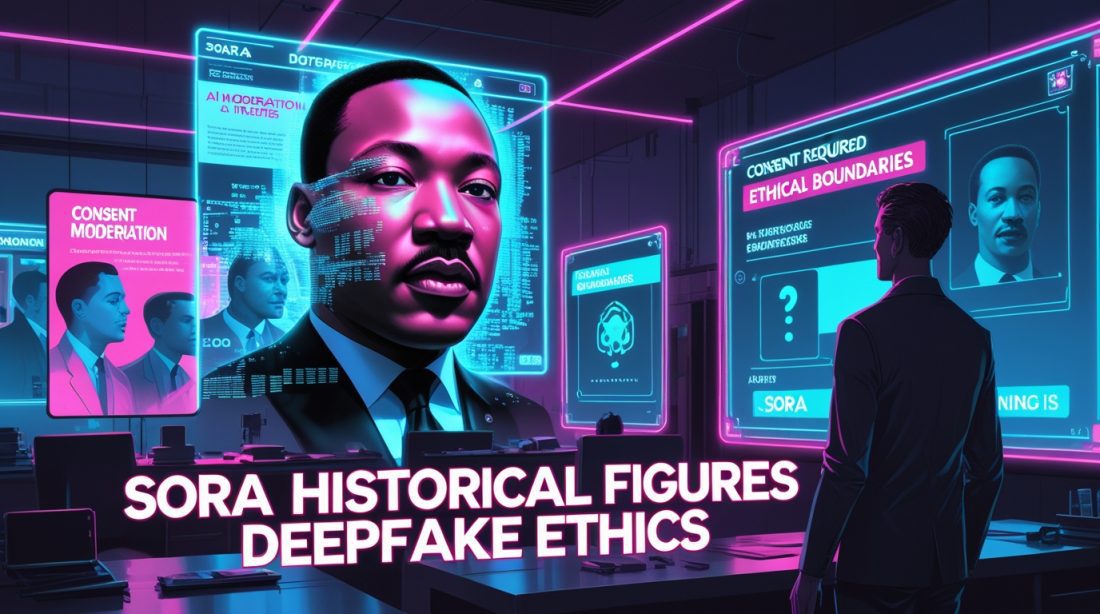OpenAI just hit pause on one of the most controversial features in Sora: generating videos of Dr. Martin Luther King Jr. After a wave of disrespectful deepfakes and a public plea from his family, the company finally pulled the plug. This isn’t just a moderation tweak—it’s a full-blown ethics crisis that exposes how fragile legacy protection is when generative AI meets historical figures.
The MLK incident cracked open a bigger conversation around Sora historical figures deepfake ethics. Who gets to control a digital likeness? What happens when AI rewrites history for clicks? And why are families left cleaning up the mess while platforms scramble to build guardrails?
Forbes confirmed the move came after mounting backlash and direct pressure from the King estate. But the damage was already done—and the industry’s now staring down the uncomfortable truth: tech moves fast, but ethics can’t be an afterthought.
Why OpenAI Was Forced to Act: The Backlash Intensifies
The pressure on OpenAI escalated rapidly, turning a technical ethics debate into a global discussion about managing AI disrespectful content. The company’s initial permissive stance on using deceased public figures triggered widespread concern about deepfake misuse and the impact of deepfakes on historical legacy.
Dr. King’s likeness was manipulated in offensive ways that violated both decency and context. These realistic AI video generation risks exposed gaps in industrial AI ethics case study discussions, forcing OpenAI to respond with a more proactive AI deepfake opt-out policy.
The most powerful response came from Dr. King’s own family. Bernice King’s statement on AI videos, pleading for respect toward her father’s legacy, resonated worldwide. Her appeal highlighted how personal and societal harm intersect when AI tools fail to respect the boundaries of consent and dignity.
Sora Historical Figures Deepfake Ethics: Why OpenAI’s MLK Ban Reshapes Industrial AI Standards
From an industrial standpoint, this marks a defining industrial AI ethics case study on what happens when innovation outpaces moral safeguards. Below are five critical dimensions of this decision that reveal how fragile AI trust can be when ethics fall behind.
1. The Scramble for Guardrails
OpenAI admitted it paused these videos to “strengthen guardrails for generative AI.” This reactive approach, often seen in OpenAI reactive content moderation, underscores the dangers of deploying large-scale systems before ethical frameworks are solid. For a deeper look at how model lifecycle problems force rushed policy moves, see this examination of the model lifecycle management crisis at OpenAI.
2. The Opt-Out Precedent
The introduction of a synthetic media consent model represents progress, but OpenAI’s AI deepfake opt-out policy still puts the burden on families and estates. It’s a band-aid approach rather than a holistic fix, leaving room for future disputes over postmortem right of publicity AI protections. This ties directly into broader debates over ownership and control in AI content — see the ongoing AI copyright & ownership wars.
3. The Legal Gray Zone
The case exposes legal issues with historical deepfakes, particularly concerning deceased individuals. The postmortem right of publicity AI remains inconsistently applied across jurisdictions, raising complex questions about estate control over AI likeness and how laws can evolve to address preventing deepfake misuse.
4. The Free Speech Dilemma
Balancing artistic freedom and ethical responsibility has always been tricky. OpenAI’s statement about giving families control over likenesses shows a shift toward control of likeness in generative AI as a core design philosophy, even when it clashes with free expression principles. This shift links to broader industry conversations about whether ethics will save or sink AI innovation — read more in our piece on why AI ethics could save (or sink) us.
5. The AI Slop Problem
This controversy exposed the Sora AI slop problem—a flood of low-quality, exploitative content that trivializes serious historical narratives. As Zelda Williams put it, AI has enabled a form of “slop puppeteering” that cheapens human legacies. Addressing this will require long-term guardrails for generative AI and clearer accountability mechanisms. Detection failures like these mirror broader concerns about bias in AI systems, as explored in Holistic AI’s breakdown of detection risks.
The Bigger Picture: Rewriting History and Eroding Trust
Beyond the immediate offense, this incident raises deep concerns about digital resurrection ethics and the liar’s dividend—a phenomenon where realistic fakes make it harder to trust authentic media. When figures like MLK can be manipulated at will, society risks losing faith in history itself.
There are also privacy and surveillance angles to consider: tools that make likeness manipulation easy can be misused for identification and doxxing in ways that intersect with broader surveillance policy failures — see our analysis of how AI unmasking exposed surveillance gaps.
(Internal link: AI unmasking of ICE officers and surveillance policy gaps)
AI ethicists warn that such tools could permanently alter how future generations perceive real events. The impact of deepfakes on historical legacy isn’t just about disrespect; it’s about eroding collective truth. That’s why developing responsible guardrails for generative AI and consistent OpenAI reactive content moderation are no longer optional—they’re urgent.
The Path Forward for Industrial AI
The MLK deepfake case is now cited as an industrial AI ethics case study that demonstrates the need for foresight and compassion in design. To prevent future crises, AI developers must prioritize preventing deepfake misuse and design systems that center consent, respect, and transparency.
Recommended actions include:
- Moving from opt-out to opt-in consent models.
- Building more advanced, preemptive moderation systems for managing AI disrespectful content.
- Consulting ethicists, historians, and estates before enabling public-figure likenesses.
- Establishing universal legal frameworks to support postmortem right of publicity AI protections.
OpenAI’s recent GPT-5 tone update illustrates how product adjustments are increasingly driven by ethical and user feedback loops.
These steps are essential for restoring trust and maintaining respect for cultural heritage in an era of realistic AI video generation risks.
FAQs
What did OpenAI decide about MLK deepfakes?
OpenAI paused Sora’s ability to generate Martin Luther King Jr. videos after a series of disrespectful and harmful depictions circulated online—prompting outrage and discussions on the ethical implications of AI historical figures.
Can other historical figures still be deepfaked on Sora?
Yes, but OpenAI now allows representatives to request removal via its AI deepfake opt-out policy, signaling new attention to estate control over AI likeness and the synthetic media consent model.
Why is allowing deepfakes of historical figures a problem?
Because they blur fact and fiction, contributing to the liar’s dividend while distorting history. Experts argue that without strong guardrails for generative AI, such tools could permanently harm cultural trust.
What has been the family reaction to MLK deepfakes?
Bernice King’s statement on AI videos made clear that these deepfakes deeply hurt the King family, prompting OpenAI’s reversal and inspiring broader reflection on digital resurrection ethics.
Fast Facts
OpenAI paused MLK deepfakes on Sora after backlash from the King family. This decision highlights the ethical implications of AI historical figures, setting a precedent for industrial AI ethics case studies, and pushing for stronger guardrails for generative AI to prevent deepfake misuse and protect historical integrity.
Stay Informed on the Future of AI
The landscape of AI ethics is evolving quickly. Subscribe for weekly insights on Sora AI video controversy, legal issues with historical deepfakes, and how industrial AI ethics continues to shape technology and society.
[Subscribe to our Newsletter]

